Abstract
IT is generally agreed that a low glycogen level in liver and muscle is a characteristic of pancreatic diabetes. Considerable importance is attached to this phenomenon in the pathology of diabetes. A similar condition has been observed in alloxan-diabetic rats by Lackey, Bunde, Gill and Harris1.
This is a preview of subscription content, access via your institution
Access options
Subscribe to this journal
Receive 51 print issues and online access
$199.00 per year
only $3.90 per issue
Buy this article
- Purchase on Springer Link
- Instant access to full article PDF
Prices may be subject to local taxes which are calculated during checkout
Similar content being viewed by others
References
Lackey, R. W., Bunde, C. A., Gill, A. J., and Harris, L. C., Proc. Soc. Exp. Biol., 57, 191 (1944).
Mirski, A., Rosenbaum, J., Stein, L., and Wertheimer, E., J. Physiol., 92, 48 (1938).
Author information
Authors and Affiliations
Rights and permissions
About this article
Cite this article
TUERKISCHER, E., WERTHEIMER, E. Liver Glycogen of Alloxan-Diabetic Rats under Different Conditions. Nature 158, 201–202 (1946). https://doi.org/10.1038/158201b0
Issue Date:
DOI: https://doi.org/10.1038/158201b0
This article is cited by
-
A study of alloxan-induced “diabetes” in the estuarine clam,Meretrix casta (Chemnitz)
Proceedings / Indian Academy of Sciences (1964)
-
Glykogengehalt und Kohlenhydratbilanz der Leber bei alloxandiabetischen Ratten
Zeitschrift für Die Gesamte Experimentelle Medizin (1952)
Comments
By submitting a comment you agree to abide by our Terms and Community Guidelines. If you find something abusive or that does not comply with our terms or guidelines please flag it as inappropriate.



